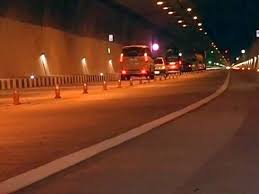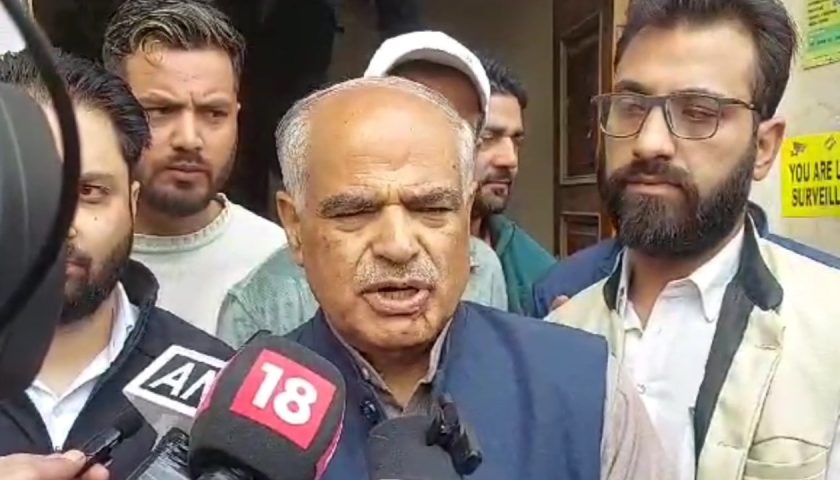 India’s longest road tunnel built on Jammu-Srinagar National Highway will open to traffic very soon following successful completion of trial run.
India’s longest road tunnel built on Jammu-Srinagar National Highway will open to traffic very soon following successful completion of trial run.
The work on the 9.2 km-long twin-tube tunnel, which is part of a 286-km-long four-lane project on the highway, started on May 23, 2011 in lower Himalayan mountain range, and cost Rs 3,720 crore, officials said.
The tunnel, which is located at an elevation of 1200 meters, will be the first in India to be equipped with world class “integrated tunnel control system” through which ventilation, fire control, signals, communication and electrical systems will be automatically actuated.
It will reduce the travel time between the two state capitals of Jammu and Srinagar by two-and-a-half hours. The road distance from Chenani and Nashri will now be 10.9 km, instead of the existing 41 km, they said.
“The formal trial run was successfully completed for peak, off peak hours between March 9 and March 15,” Project Director, IL&FS, J S Rathore told PTI.
Prime Minister Narendra Modi is likely to inaugurate the highway tunnel by month-end.
“The tunnel will be formally thrown open to general vehicular traffic after the inauguration by Prime Minister Narendra Modi soon,” Rathore said.
Once the tunnel becomes operational, it will reduce the traffic jams on National Highway-1A that occur due to snowfall and avalanches in winter at Patnitop, Rathore said.
Travel will cost an LMV vehicle Rs 55 on one side and Rs 85 for to-and-fro journey and Rs 1,870 for one month travel, while bigger vehicles like mini buses will have pay Rs 90 as one side toll and Rs 135 for to-and-fro toll. Buses and trucks will have pay Rs 190 as one side toll and Rs 285 as two side toll.
Highlighting the salient features of this state-of-art hi-tech tunnel, Rathore informed that Infrastructure Leasing and Financial Services (IL&FS) Company has setup a well-equipped fully computerized operation room for surveillance of vehicles inside the twin tubes.
“For feeding input to the aforesaid Operation Room, 124 CCTV cameras have been installed at equal intervals of 75 meters, three-tier system has been fitted to light-up the tunnels round the clock,” Rathore said.
An innovative SOS system has also been introduced to make contact with the team sitting in the Operation Room in case of an emergency besides effective fire fighting gadgets and hyper-sensitive ventilation system to ensure hassle free journey.
“The maximum speed limit permitted for vehicles plying inside twin tunnel tubes is 50 km per hour with head lights on at low beam.
“Containers carrying inflammable material are banned from entering the tunnel,” he said.
Rathore said that maximum height limit permitted is 5 meters and for checking the height special sensors have been installed just before the toll points at both ends.
“Besides providing mobile network of telecom operators including Airtel, Idea and BSNL, 92.7 FM Radio channel facility is also functional inside the tunnel,” he said.
IL&FS is all set to handover the tunnel project to National Highway Authority of India (NHAI) soon after its formal inauguration by the Prime Minister.
NHAI awarded the strategic tunnel project to IL&FS Transportation Network Limited and it includes four laning of Chenani to Nashri sector between Jammu and Srinagar of NH-1A by constructing the two-tube tunnel.
“The tunnel provides an all-weather route that will result in significant time saving for motorists travelling along NH1 between Jammu and Srinagar”, Rathore said.
The tunnel project involves construction of nine- kilometre-long two lanes (13 metre diameter) of main tunnel along with parallel escape tunnel (6 metre diameter) interconnected with 29 cross passages at 300 meter interval.
“In-spite of many odds, we have been able to complete excavation for 19 km for main tonnel, nine km of escape tunnel and one km of cross section passages) in less than four years time, which is a record,” Rathore said.
“The tunnel will provide safe and an all-weather route that will result in a significant time savings to motorists travelling along highway between Jammu and Srinagar, which is prone to frequent and long period traffic jams due to landslides, snow and sharp curves breakdown of vehicles and accidents”, he said.
Rs 27 lakh worth of fuel is likely to be saved per day, he added.
The tunnel will also ensure preservation of pristine forest in ecological sensitive Patnitop area and will provide for better integration of Jammu not only with people of Kashmir?but also with Kishtwar, Doda and Bhaderwah by providing better connectivity.
The project has provided employment to about 2,000 unskilled and skilled youth of Jammu and Kashmir as 94 per cent of the work force has employed from the state.





